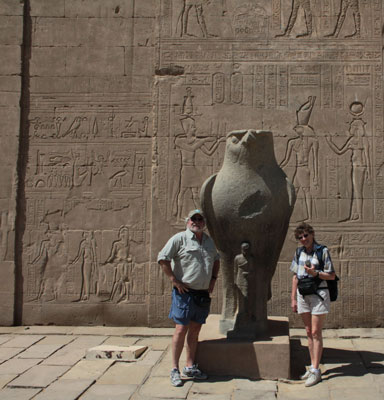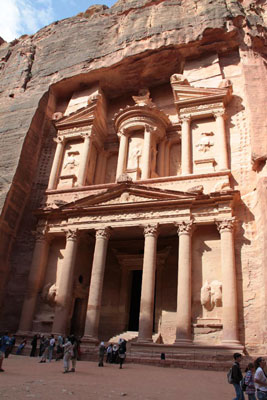Egypt after Mubarak
My husband, R.C., and I had booked our flights on Jan. 2, 2011, and committed to a trip to Egypt and Jordan for April 13-May 3. Then the uprisings began in Cairo. On Jan. 25, Internet and cell service were cut off. A full month would go by before we could make contact with our tour provider.
To plan our trip and guide us on the Cairo and Alexandria portions, we had selected Ibrahim Morgan (phone 20 1234 76 343), recommended by readers on ITN’s website (a search on “Egypt”). We, too, recommend him. Ibrahim’s knowledge and expertise, his command of English and his great energy and sense of fun put him head and shoulders above any ordinary guide.
On Feb. 28, Ibrahim assured us that all was quiet. Media announcements from such companies as Grand Circle Travel/OAT that they were resuming their Egypt schedules also reassured us. We were going!
We took the precaution of using the US State Department’s recommended Smart Traveler Enrollment Program, or STEP. You give them your itinerary and a phone number and e-mail address for reaching you. However, neither of these channels of communication was open during the uprising in Egypt.
So what did we find?
Everyone we talked to was happy about the overthrow of Mubarak because he was so corrupt, had gotten rich at the expense of the Egyptian people and had allowed his police to use abusive power. But perceptions of what might or should happen next differed.
We heard in the news immediately after Mubarak stepped down that, after finding demonstrations an effective vehicle, Egyptians were demonstrating over any issue (work hours, wages, etc.). We found examples of this frequently during our trip.
There was a demonstration blocking the road between Aswan airport and the city. It was merely a bunch of students who wanted their “institute” to be reclassified as a “university,” but everyone who came along was jumping out of his car and joining the argument.
The students were rocking cars and jeering anyone who aggressively challenged them. Unfortunately, we had a hot-headed driver who immediately got belligerent with them. After getting into a fight with one of the participants, he pulled our car, with us in it, into the middle of the fray. Fortunately, calmer heads prevailed and got traffic flowing again.
We were repeatedly told that no Egyptian would hurt a tourist. They are taught from a very early age how important tourists are to them.
For a couple of days, we were not sure if we would be able to take a scheduled trip from Luxor to the ancient sites of Abydos and Dendara. The highway was being blocked by people who wanted their newly appointed governor to be replaced.
Whenever we were walking somewhere, we quickly moved away from any shouting or arguments. In the absence of a functioning police force, Egyptians seemed to be taking it upon themselves to resolve disputes.
Shopkeepers were negotiating with tour guides to keep them from saying ‘This is not a good price.’ It seems shopkeepers also had forced government officials to close the “normal” entrances/exits of tourist sites and replace them with walkways that forced visitors to pass by the shops.
With the lack of police protection, some shops, primarily jewelry stores and others with expensive merchandise, were still closed.
All this said, we felt our visit to Egypt was a huge success. We were ultimately able to do everything on our itinerary.
On our visit, the level of tourism in Egypt was down to perhaps 25%-30% of normal. We felt this was a huge benefit to us, having read that Egypt had become so crowded in 2010 that it detracted from the experience. Most tourists were European; we saw very few Americans.
In terms of tourist facilities, our biggest finds were in Luxor. Referenced in the Lonely Planet guide, Arkwrights Gourmet Food (phone 095 228 2335), on St. Joseph Street, is a great place to pick up a sandwich and snacks. A made-for-you sandwich — fresh, delicious bread and a generous quantity of meat plus cheese and tomatoes — cost only $2. A Coke was only 40 cents!
The people at Arkwrights put us onto The Lantern Restaurant (Al Roda al Sharifa St., Luxor; phone 002 095 236 1451). This top-quality restaurant stated right on their menu that their fresh vegetables and fruits were washed in mineral water, so, in that respect, their produce would be safer to eat. Two meals (no appetizers, no dessert, no alcohol) cost us $20 to $30.
One night there, I was tired of big meals and, instead, had lentil soup for about $1.50. It was, by far, the best lentil soup we had on this trip (and we had it often).
We had last been in Egypt in 1992. On this trip we were able to go into King Tut’s tomb in the Valley of the Kings, see some new tombs discovered at Saqqara, visit Alexandria, which we had missed previously (the new library is very impressive), see improvements at the National Museum in Cairo and visit a whale-fossil location that wasn’t open on our previous trip.
Jordan was new to us. We went there knowing only that we wanted to see Petra; we let the tour operators put together the rest of the visit. Other must-see places are Jerash (an incredibly large and well-preserved Roman city that also stages a chariot race daily in the original hippodrome) and the Dead Sea (for the experience of floating in salt water). The food we had in Amman was outstanding.
Mostly because of the unrest in neighboring Egypt and Syria, Jordan’s tour-cancellation rate was 75%-80%. Jordan is politically stable and has a varied landscape and much more pleasant weather than Egypt has. We found the shopkeepers polite and the drivers sane. In short, there’s a lot to recommend Jordan as a tourist destination in the Middle East.
Because we chose to go it alone rather than join a group, this was an expensive 21-day trip — in excess of $16,000, including international airfare, all contracted services, a few extras and tips.
R.C. uses hearing aids, which makes hearing in a group almost impossible. Also, on an independent trip, we were able to specify exactly what we cared to see. The only factory tour we took was one to a mosaic shop that interested us in Jordan. No carpet, jewelry, papyrus or perfume shops! Also no mosques or churches; been there, done that. We visited both the Bent and Red pyramids, which are not on standard tours.
Remember that these are cash-based societies, so you must be geared for carrying significant amounts of cash. ATMs were easily found and used in major cities.
So, although it’s important to be on your toes and aware of what’s going on around you in the Middle East, this is an exciting time to be there. We felt fortunate to visit.
DONNA PYLE
Boulder, CO


